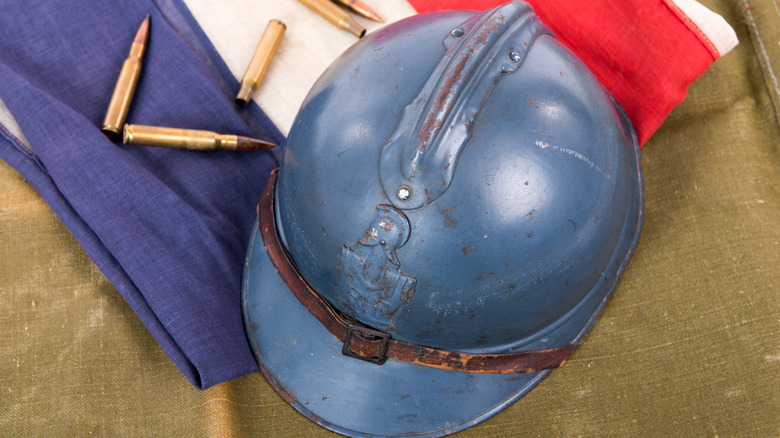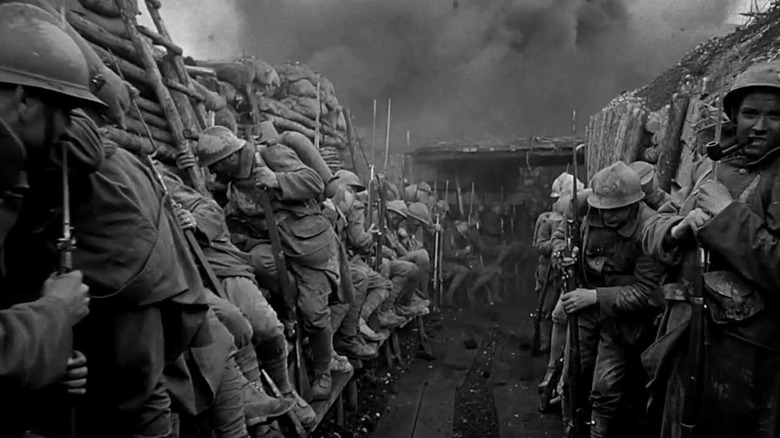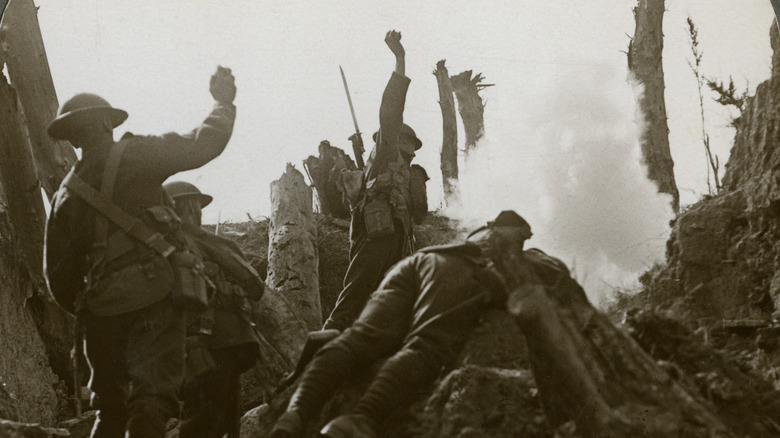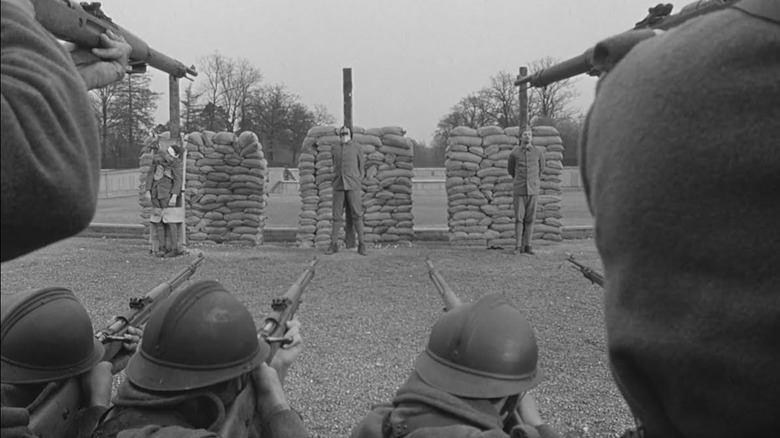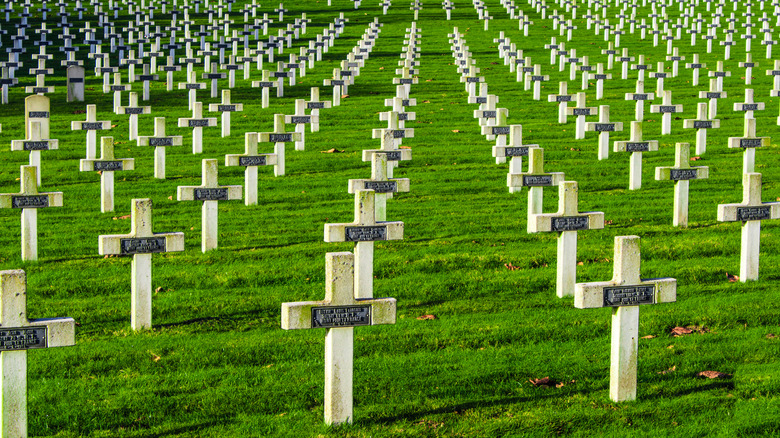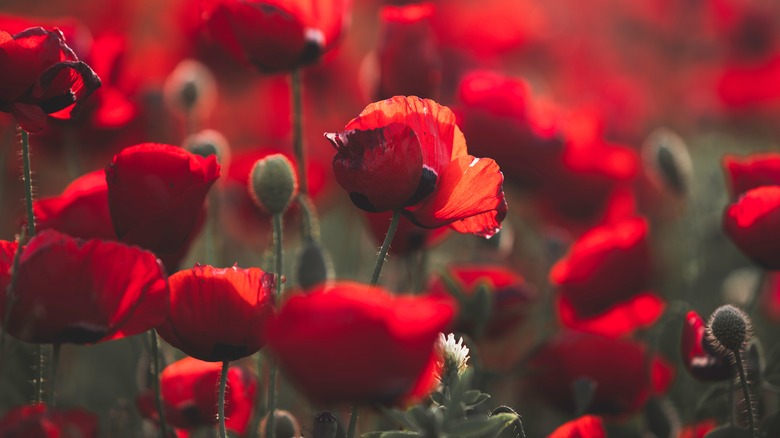Paths Of Glory Was Loosely Based On A Tragedy That Left Four Soldiers Dead
What is a soldier to do when he is as likely to get shot by his own side as he is by the enemy? This is the central question of Stanley Kubrick's World War I epic "Paths of Glory," arguably one of the greatest anti-war films ever made, created by one of history's most talented directors, and starring mega-celebrity of the 50s and 60s Kirk Douglas (via IMDb). Today, "Paths of Glory" has retained its shine, honored with a place on IMDb's top 250 films of all time list.
The movie tells the tragic story of a group of French soldiers who disobeyed orders during WWI. While today there are a whole host of war films that take pot-shots at senior officers from the period ("1917" and "War Horse" being two of the more recent examples), the critique offered by "Paths of Glory" is far more blatant and damning.
When the film was first released in the '50s, WWI was still a raw topic. Outraged by Kubrick's work, "Paths of Glory" was banned in Switzerland, while in France, distributors refused to show the movie until the 1970s (via The New York Times). As is often the case, the really offensive thing about the movie was that it told the truth — Kubrick's tale was based on a real event, the Souain Corporals Affair of 1915.
No Way Back
The basic plot of the movie is this (warning, spoilers ahead): French General Georges Brourlard, tucked safely away in a fancy house far from the action, orders French troops to take a coveted German position known as the Anthill (via Roger Ebert). Because as we know, unpleasant things generally roll downhill, the responsibility for carrying out Brourlard's crazy request is passed down the ranks. Brourlard knows many people will die, but he offers no plan or strategy. He simply suggests that his subordinate, General Mireau, use the men as cannon fodder on the off-chance it might work.
Mireau, aware of the risks but hoping for professional recognition, relays the order to Colonel Dax (Kirk Douglas). Dax is concerned by the order but does as he is told — instructing his men to charge into the enemy guns. Everybody involved knows the attack is a terrible idea and lots of people die needlessly.
After a bloody opening, the second wave of French troops refuses to follow their compatriots to certain death, staying put in the trenches. General Mireau responds to this disobedience by asking the French artillery to attack their own men — an order they mercifully refuse to carry out (via The Guardian).
When this doesn't work Mireau demands his troops be court-martialled for cowardice. The rest of the movie focuses on the absurd trial and execution of three unlucky soldiers, who take the blame for refusing to follow poorly thought-out and suicidal commands.
The Souain Affair
Although the names have been changed in the movie, and four soldiers rather than three were executed, the events depicted in the film are largely accurate. The story is a loose retelling of a suicidal attempt to take the area around Souain in Northern France in 1915 (via The Guardian). In the film, General Mireau is a stand-in for General Réveilhac, a callous commander who did indeed order the shelling of his own troops.
French soldiers had been sent into the field at Souain on three separate occasions before the final attack, each time failing to make any progress. The last attempt at a push was ordered on the 10th of March, but the 21st company again pulled back. According to a Time magazine article from the 1930s, artillery fire had been ordered beforehand to clear a path for the soldiers — but it was poorly executed and achieved nothing. Left with little choice, and facing the heavy German guns, the soldiers retreated.
Réveilhac responded to the retreat by ordering the shelling of his own troops, which thankfully the artillery operators refused to do. To save face, he had four regular soldiers shot for cowardice after the battle.
The story was later dug up by the French magazine Crapouillot, and immortalized by writer Humphrey Cobb in his novel "Paths of Glory," less well-known than the film adaption of the same name (via Penguin Random House).
Some Justice
While Réveilhac may have been raked across the coals in the French press, after his role in the affair came to light, the sadistic general never really suffered any consequences for his actions. "Paths of Glory" is in a sense a cathartic retelling of the tale that offers some justice. At the end of the film, Kirk Douglas gets to express the audience's anger and disbelief at the French high command for their gross egotism, incompetence, and inhumanity. Yelling at General Brourlard, Colonel Dax calls him a " ... degenerate, sadistic old man" (via IMDb). As the movie draws to a close, Mireau is called out for his crimes and put under investigation, while in real life General Réveilhac was celebrated — offered a prestigious post as a Grand officer of the Legion d'honneur (via The Guardian).
Thankfully, the four soldiers who were shot for their supposed cowardice did have their names cleared eventually after an inquiry. Thanks to 19 years of dogged hard work, the widow of one of the victims won a legal battle to have the episode recognized as an injustice, and the families of the four corporals received a single Franc each for their trouble (via Time).
Lions Led by Donkeys
Unfortunately, the four men shot in Souain Affair were not unique — the British and the French shot many men for so-called cowardly acts during the war (via The Guardian). Those traumatized by shellshock were given particularly short shrift at a time when the condition was poorly understood (via the BBC). A reference to shellshock is also made in the film. Early in the movie, General Mireau tells a clearly disturbed babbling soldier that the condition does not exist and that he is a coward (via The Guardian).
In France, during the run-up to the 100-year anniversary of WWI, historic injustices of this kind were highlighted by commentators and those still seeking justice for the victims. One French historian Antoine Prost estimated that at least 600 Frenchmen had been shot for disobeying orders during the war. In the U.K., those shot for cowardice in WWI were finally posthumously pardoned in 2006.
The Green Fields of France
Today, "Paths of Glory" remains one of the finest anti-war movies of all time on a par with Vietnam War film "Deerhunter," and the Russian WWII classic, "Come and See." Kubrick's masterpiece highlights the absurdity of some of the strategies used in WWI. Throwing warm bodies in front of machine gun fire had very little effect, and often resulted in massive death tolls at terrible battles such as the Somme, in which 60,000 men died in the first 24 hours (via History).
Highly praised for its portrayal of class issues and the petty ambitions of the small-minded generals (via The Guardian), British Prime Minister Winston Churchill, who fought in the trenches in WWI (via America's National Churchill Museum), is said to have commented that "Paths of Glory" was a highly accurate portrayal of the military, and of trench warfare in particular (via The Radio Times).
Above all, the film asks us to question the sorts of power structures that create situations like the Souain Affair. As Colonel Dax remarks in the book version of "Paths of Glory": "Silly ... but the mere issuing of a command always inspires confidence. It doesn't matter whether it is a necessary command, or even a correct one" (via Goodreads).
